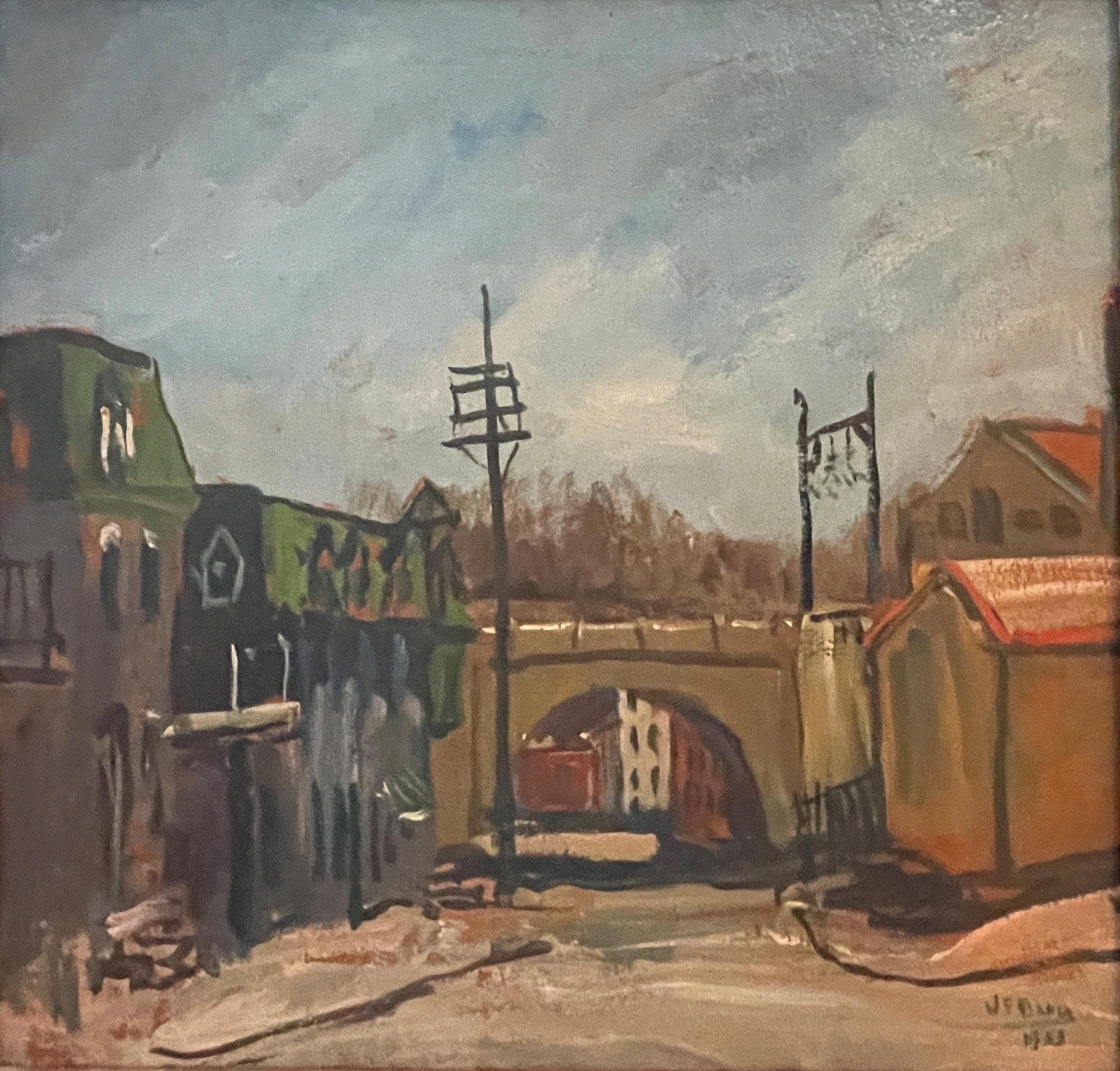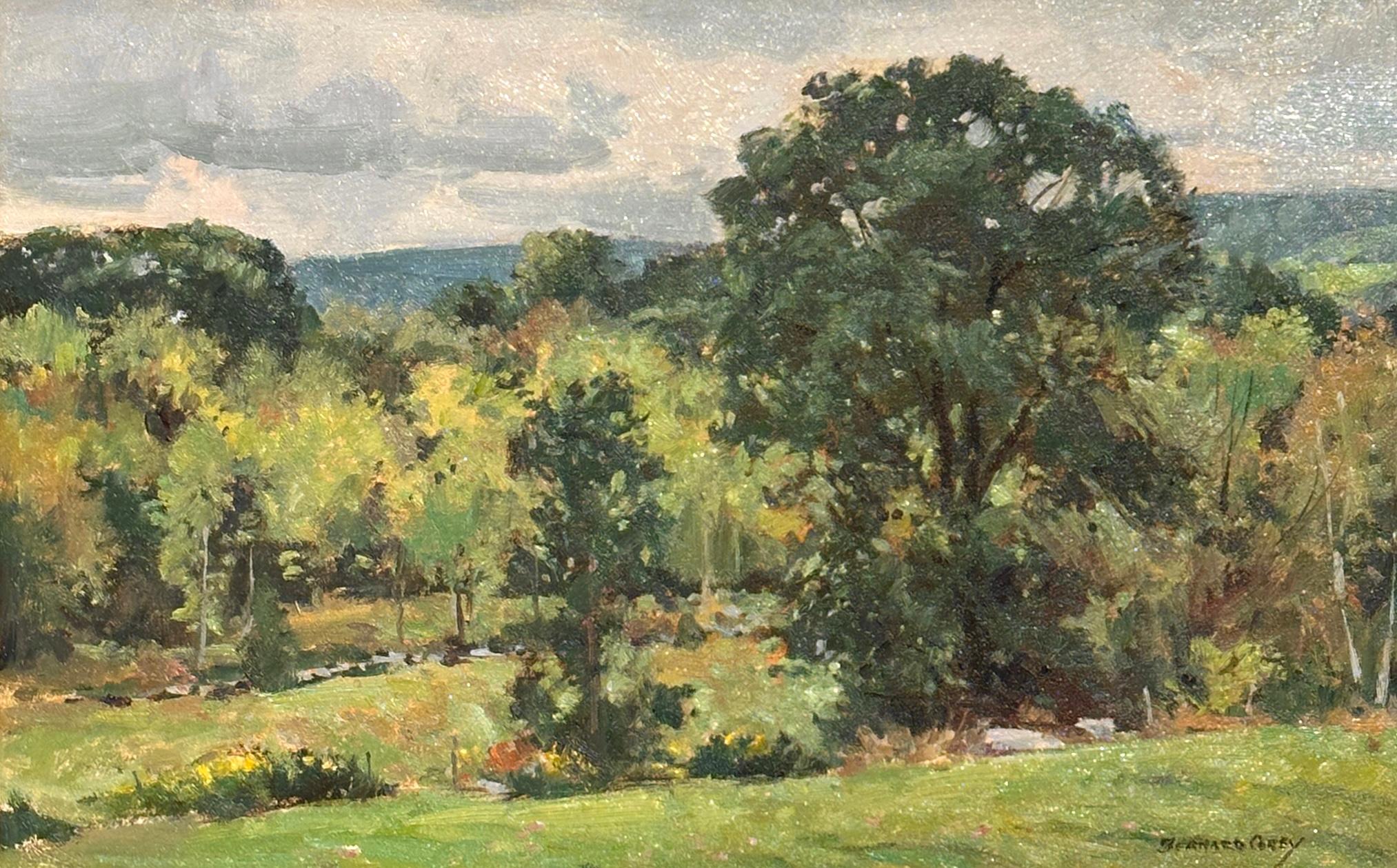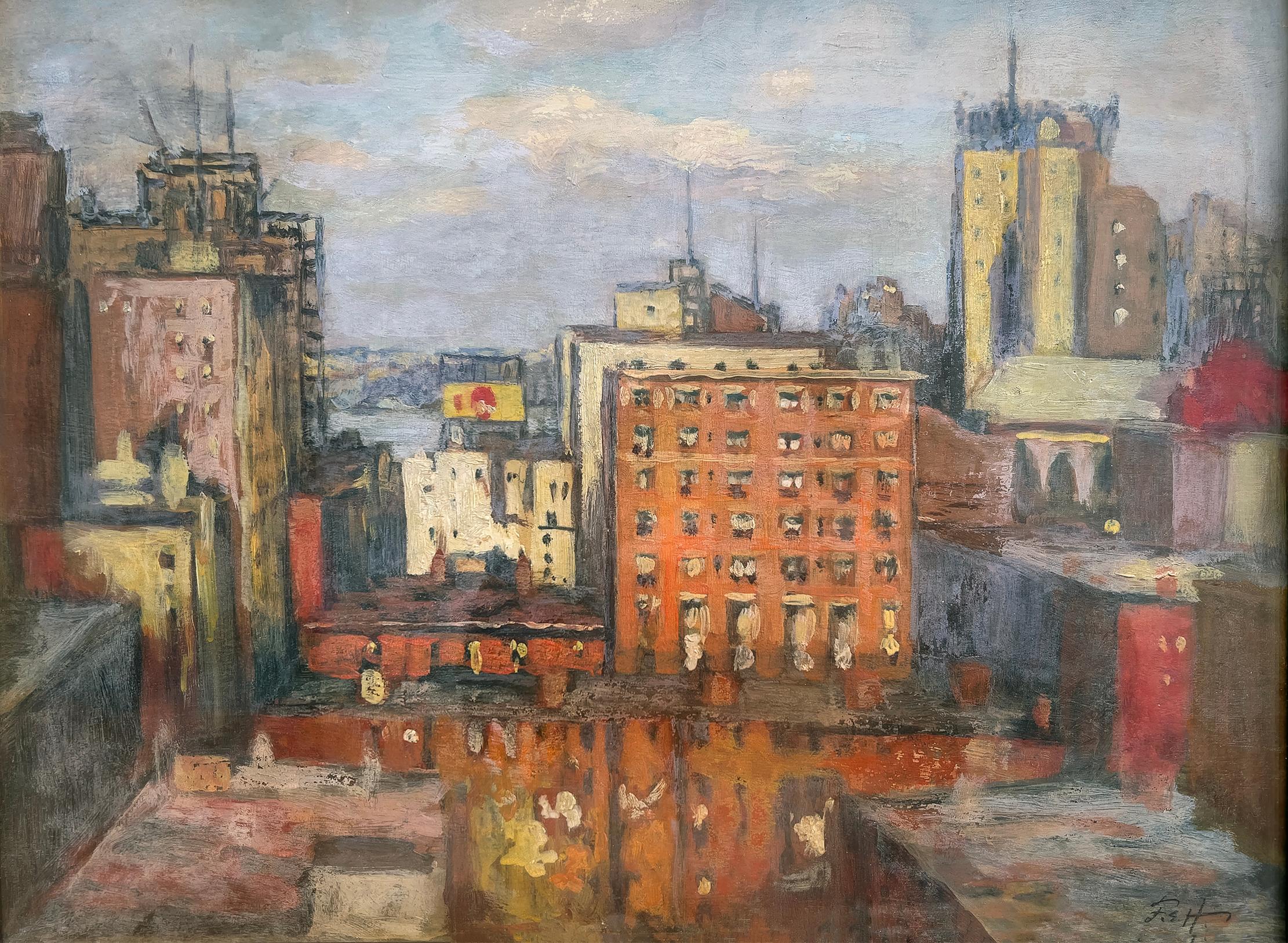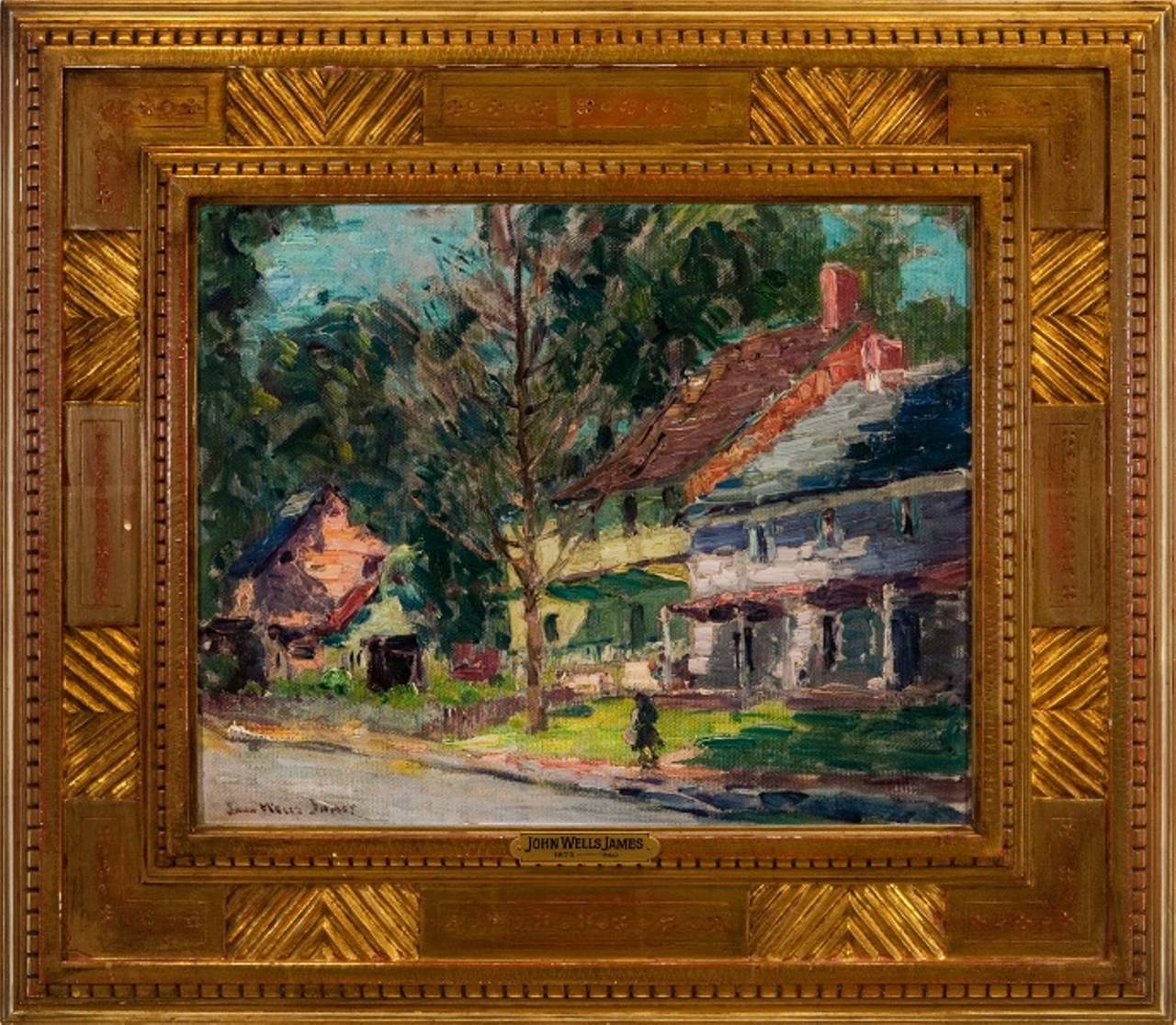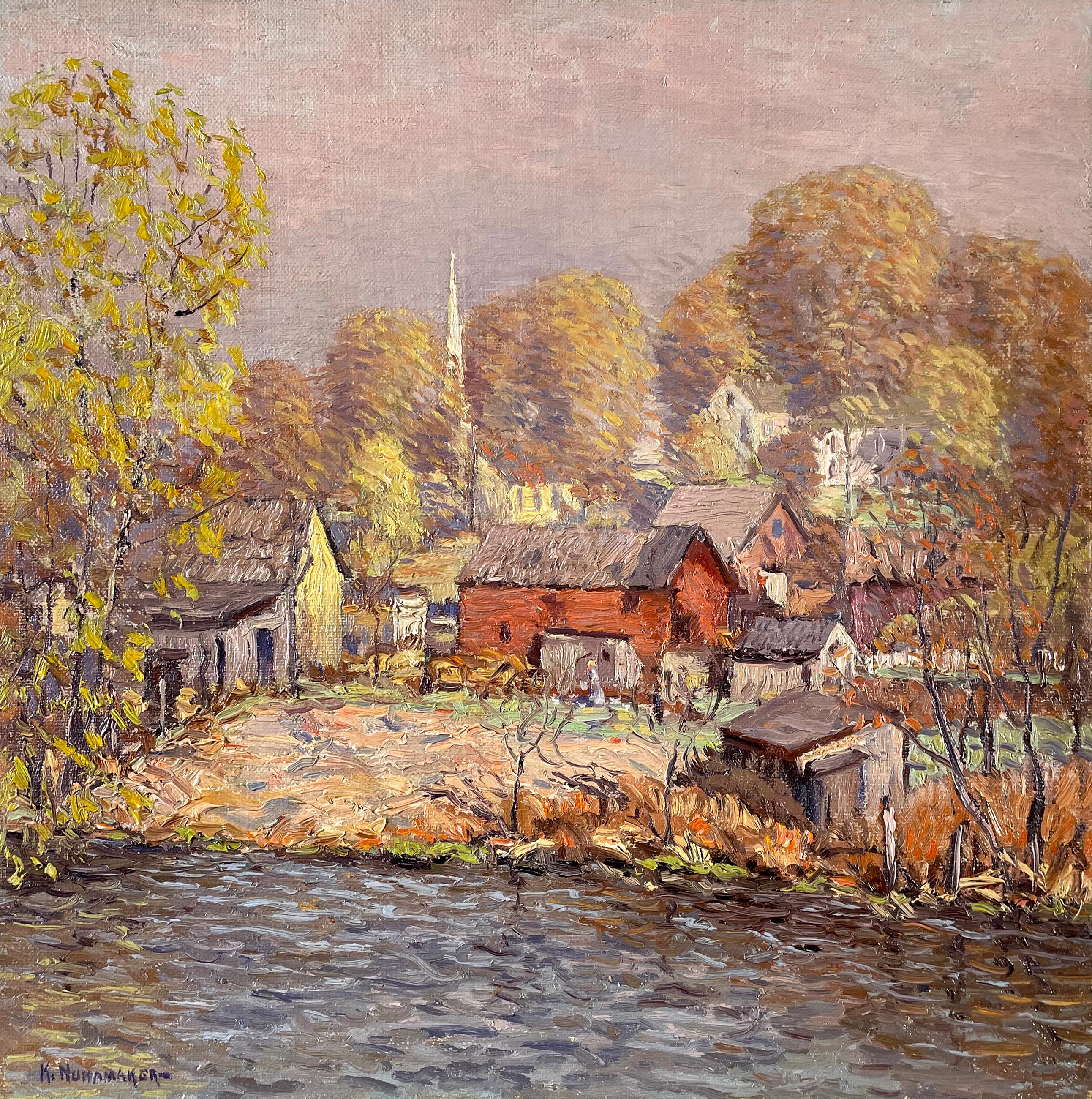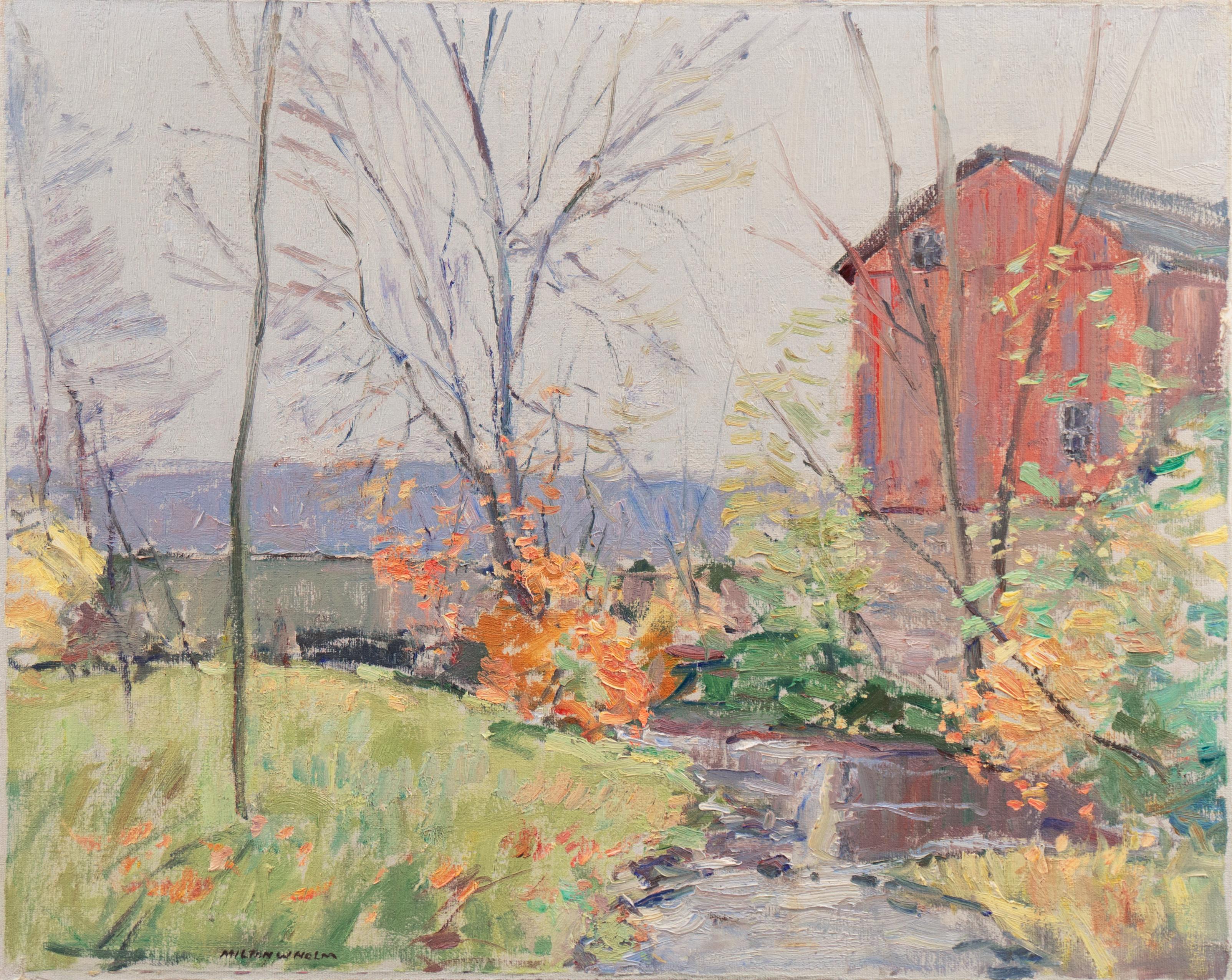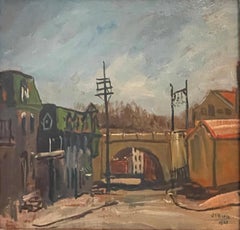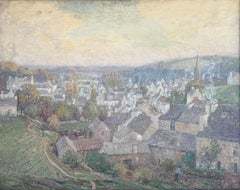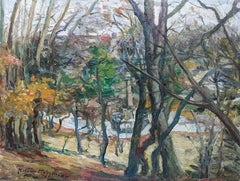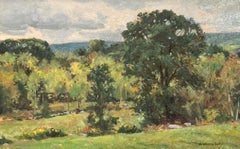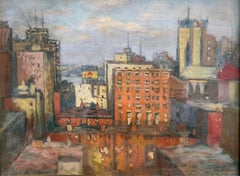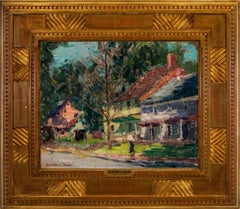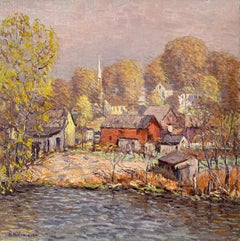Items Similar to "Brooklyn, New York" Frederick James Boston, Impressionist Brooklyn Landscape
Want more images or videos?
Request additional images or videos from the seller
1 of 6
Frederick James Boston"Brooklyn, New York" Frederick James Boston, Impressionist Brooklyn Landscape
$1,800
£1,395.67
€1,583.65
CA$2,580.22
A$2,805.62
CHF 1,478.29
MX$34,080.20
NOK 18,585.09
SEK 17,422.02
DKK 11,883.88
About the Item
Frederick James Boston
Brooklyn, New York
Inscribed verso
Oil on board
7 1/2 x 9 1/2 inches
Though understudied today, Frederick James Boston was a well-known and respected teacher and painter during his lifetime who was very active in art circles in New York City and Brooklyn in the late nineteenth- and early twentieth-centuries. He was born in Bridgeport, Connecticut in 1855 to Mary (Sanborn) and William Boston. Boston had moved to New York City to develop his artistic career, living in in Brooklyn where he became very active in the local art community. He taught painting from his studio on Montague Street, as well as being the first instructor of art at the Brooklyn Institute of Arts and Sciences. Beginning in the late 1890s, Boston became increasingly focused on his landscapes, which he frequently painted in suburban Kings County in the Flatlands and the vicinity of Cowenhoven Farm.
Into the 1910s, visitors to Boston’s studio in the Ovington Building make frequent mention of the numerous landscape studies housed there. In 1914, Boston showed a Pennsylvania landscape entitled "Morning Mist, Delaware Valley" in a special exhibition of works of American painters held at Murray Hill Art Galleries on West Thirty-first Street. In the 1890s, Boston, as a major figure on the Brooklyn art scene, served as the first art instructor at the fledgling Brooklyn Museum.
- Creator:Frederick James Boston (1855 - 1932, American)
- Dimensions:Height: 7.5 in (19.05 cm)Width: 9 in (22.86 cm)
- More Editions & Sizes:Unique WorkPrice: $1,800
- Medium:
- Movement & Style:
- Period:
- Condition:
- Gallery Location:New York, NY
- Reference Number:1stDibs: LU1841215191142
About the Seller
5.0
Platinum Seller
Premium sellers with a 4.7+ rating and 24-hour response times
Established in 2022
1stDibs seller since 2022
127 sales on 1stDibs
Typical response time: 1 hour
- ShippingRetrieving quote...Shipping from: New York, NY
- Return Policy
Authenticity Guarantee
In the unlikely event there’s an issue with an item’s authenticity, contact us within 1 year for a full refund. DetailsMoney-Back Guarantee
If your item is not as described, is damaged in transit, or does not arrive, contact us within 7 days for a full refund. Details24-Hour Cancellation
You have a 24-hour grace period in which to reconsider your purchase, with no questions asked.Vetted Professional Sellers
Our world-class sellers must adhere to strict standards for service and quality, maintaining the integrity of our listings.Price-Match Guarantee
If you find that a seller listed the same item for a lower price elsewhere, we’ll match it.Trusted Global Delivery
Our best-in-class carrier network provides specialized shipping options worldwide, including custom delivery.More From This Seller
View All"Manayunk" Walter Emerson Baum, Pennsylvania Impressionist Landscape of Manayunk
By Walter Emerson Baum
Located in New York, NY
Walter Emerson Baum
Manayunk, 1953
Signed and dated lower right; titled and dated on the reverse
Oil on board
12 x 14 inches
Walter Baum was born December 14, 1884 in Sellersville,...
Category
1950s American Impressionist Figurative Paintings
Materials
Oil, Board
"French Landscape" Wilson Irvine, American Impressionist Rural French Town
Located in New York, NY
Wilson Irvine
French Landscape, circa 1908
Signed lower right
Oil on canvas
29 x 36 inches
A prolific Impressionist with a penchant for atmospheric scenes, Illinois native Wilson I...
Category
Early 1900s American Impressionist Figurative Paintings
Materials
Canvas, Oil
"Prospect Park, Brooklyn" Nathan Hoffman, New York City Impressionist Landscape
Located in New York, NY
Born in Russia, the son of Friede (1878 – 1956) and Benjamin Hoffman (1878 – a. 1942). Benjamin was a dealer in mineral and seltzer water and the family resided on Snediker Avenue in Brooklyn, New York, just down the streetfrom the home where George Gershwin (1898 – 1937) was born.
This area of Brooklyn, known as Brownsville, “witnessed the development of one of the largest communities of Eastern European Jewish immigrants during the last decade of the 19th century and the first two decades of the 20 th century.” Today, little remains of this once thriving Jewish section of Brooklyn, which today houses many commercial and repair businesses.
Hoffman studied at the Art Students League of New York, the National Academy of Design and in the art program at Cooper Union. His work at the National Academy received praise, and in 1921 he was awarded the 2nd prize and an honorable mention from the John Armstrong Chaloner Paris Prize Foundation at the National Academy, which allowed the recipient to study in Paris, France for as long as five years. The following year he was awarded the 1 st prize in the competition (with The Reform Advocate running the headline “Young Jew Wins Art Prize”) as well as the Suydam Bronze Medal for his achievements in the Academy’s Men’s Night Class. In 1923 he was residing in Long Branch, New Jersey, when he was awarded 4th place in the Chaloner competition.
Early on, Hoffman exhibited his work throughout the city, including in 1925 with the recently organized Society of Independent Artists. He also received several solo exhibitions during the first part of his career, including one at Ferargil Galleries in 1929. In the spring of 1930 a solo exhibition of his portraits, including paintings and drawings, was held at at Babcock Galleries, where a reviewer noted: “Portraiture is obviously Mr. Hoffman’s specialty… his best work is characterized by a sensitive appreciation of character set down in a vigorous decisive statement.
Later that same year, in August, he participated in Babcock’s summer exhibition where reviewer Jerome Klein, writing for The Baltimore Sun, felt Hoffman’s and other artists work was already becoming old fashioned, remarking “…if an effort toward accomplishment is to be made, it must be in the language of today. It is for that reason that such contemporaries as Eugene Higgins and Nathan Hoffman, in this show, seem artists of a bygone era…” The onset of the Great Depression appears to have slowed his success, as was the case for many up-and-coming artists.
By 1939 Hoffman had become a gallerist in addition to being a painter, operating the collective exhibition space “Sutton Gallery,” which was originally located at 358 East 57th Street. There Hoffman exhibited his own works as well as those created by other prominent New York artists including David Burliuk (1882 – 1967), Charles C. Curran (1861 – 1942), Louis Eilshemius (1864 – 1941), Ann Goldthwaite (1869 – 1944), Maurice Kish (1895 – 1987), Lawrence Lebduska (1894 – 1966), Bradford Perin and Ellis Wilson...
Category
1940s Post-Impressionist Landscape Paintings
Materials
Board, Oil
"Road to Provincetown, " Henry MacGinnis, Massachusetts Landscape
By Henry Ryan MacGinnis
Located in New York, NY
Henry Ryan MacGinnis (1875 - 1962)
Road to Provincetown, 1924
Oil on canvas
25 x 30 inches
Signed lower right; titled and dated on the stretcher
Housed in a Stanford White Newcomb-Macklin frame.
Exhibited:
Trenton, New Jersey, School of Industrial Arts Provincetown by Professor MacGinnis, 1924.
Henry Ryan MacGinnis, 1875-1962, was born in Indiana and began his art studies under the eminent Hoosier artists T.C. Steele, J.O. Adams and William Forsyth. One of his earliest exhibitions was in 1896, when he showed his work with other notable Hoosier artists such as T.C. Steele, J. Ottis Adams...
Category
1920s American Impressionist Landscape Paintings
Materials
Canvas, Oil
"Rockport" William Lester Stevens, North East Coastal American Landscape
By William Lester Stevens
Located in New York, NY
William Lester Stevens
Rockport
Signed lower right
Oil on canvas
20 x 24 inches
Born on June 15, 1888, in Rockport, Massachusetts, Stevens displayed his artistic abilities from a y...
Category
1920s American Impressionist Figurative Paintings
Materials
Canvas, Oil
"Green Landscape" Arthur Hoeber, American Impressionist, Early 20th Century
By Arthur Hoeber
Located in New York, NY
Arthur Hoeber
Green Landscape, circa 1910
Signed lower right
Oil on canvas
25 x 30 inches
Provenance
Sal Sciarrino, New Jersey
Born in New Jersey in 1854, Arthur Hoeber had a natu...
Category
1910s American Impressionist Figurative Paintings
Materials
Canvas, Oil
You May Also Like
Plein Air Painting Bernard Corey American Impressionism
By Bernard Corey
Located in Rockport, MA
Painting size without frame: 9"x14"
Painting size with frame: 13"x18"
Signed lower right
A luminous plein air painting by Bernard Corey, "Spring Has Sprung" captures the soft awake...
Category
20th Century American Impressionist Landscape Paintings
Materials
Oil
New York Skyline the West Side with Hudson River - Vintage New York
By Frank S. Hermann
Located in Miami, FL
Rooftop view of the upper West Side Manhattan as it looked in the 1930s. There is a rough indication of a billboard and a glimpse of the Hudson River. The cluster of buildings depic...
Category
1930s American Impressionist Landscape Paintings
Materials
Oil, Gouache, Board
"A New Hope Street"
By John Wells James
Located in Lambertville, NJ
Jim’s of Lambertville is proud to offer this artwork.
Signed lower left.
Complemented by a hand carved and gilt frame.
Illustrated in "New Hope for American Art"
John Wells Jame...
Category
1920s American Impressionist Landscape Paintings
Materials
Oil, Canvas
Early View of Stockton, New Jersey
Located in Bryn Mawr, PA
Kenneth Nunamaker never took a formal art lesson. His “training” began during his travels out West as a young man, where he painted in his spare time. It continued informally through...
Category
1930s Impressionist Landscape Paintings
Materials
Oil, Board
'Rochester, New York', National Academy of Design, Rockport Art Association, Oil
By Milton W. Holm
Located in Santa Cruz, CA
Signed lower left, 'Milton W. Holm' (American, 1903-1999) and painted circa 1960.
This notable American Impressionist was a long-time member of the Rochester Art Club and served as...
Category
1950s American Impressionist Landscape Paintings
Materials
Oil, Board
Lake Street
Located in Los Angeles, CA
Lake Street, c. 1920 -30s, oil on board, 12 x 9 inches, signed lower right and verso, titled verso
About the Painting
At the center of Oscar Daniel Soellner’s Lake Street, we see the stairway leading to an elevated railway station on what is now Chicago’s Green Line route. When its first section opened in 1893 as the second permanent elevated rapid transit line in Chicago, this route was known as the Lake Street Elevated Railroad. Chicago’s “L,” like the New York subway and rapid transit system, played an instrumental role in the development of the urban economy and the overall look and feel of the city. The formal aspects of urban railroads and the role they played in efficiently moving large number of everyday citizens across America’s growing metropolises were catnip for many American Scene painters during the first half of the 20th Century. Here, Soellner uses the techniques of the impressionists and the palette of the Ash Can School, to convincingly depict a classic Chicago scene...
Category
1920s American Impressionist Landscape Paintings
Materials
Oil
More Ways To Browse
Brooklyn Oil Painting
Oil Paintings Boston
Boston Landscape Paintings
Boston Landscape Oil Painting
Meat Painting
Mermaid Oil Paintings
Mother And Baby Art
Norman Lewis
Original Book Covers
Salzburg Festival
Street Urchin
Ted Hughes
The Guys With The Same Name
Theatre Canvas
Three Muses
Used Paint Robots
Used Tuba
Bill Withers
